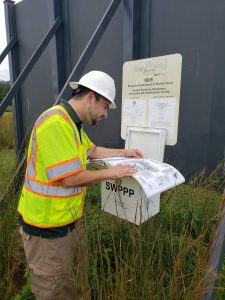
Maryland’s draft CGP is out for public comment – and it includes significant changes for land disturbers.
The most significant changes for land disturbing activities include:
- Permittees will have the option to perform erosion and sediment control inspections either once a week with post-rain inspections within 24 hours of 0.25 inches of rainfall or every four business days. The current permit requires inspections once a week with post-rain inspections within 24 hours of a runoff producing event – no rainfall amount is specified.
- The draft CGP includes detailed pollution prevention guidelines and requirements to minimize the potential discharge of pollutants, including spilled or leaked materials.
- A Stormwater Pollution Prevention Plan (SWPPP) would be required with the Notice of Intent (NOI) if the permittee anticipates any of the following:
- use of chemical additives or polymers for sediment control (see below for additional information)
- a potential for any prohibited non-stormwater discharges
- implementing controls associated with pollution prevention
- MDE will allow permittees and operators to use chemical additives for sediment control, as long as the activity is identified in the NOI and SWPPP (dry powder polymer for soil stabilization, for example). MDE will provide a list of approved chemicals, along with a process to receive approval to use additional chemicals on a case-by-case basis.
- When land disturbing activities are in or discharging to a Tier II watershed, the permittee and operator must take extra steps to prevent negative impacts to watershed. Those include providing an “antidegradation checklist” with the NOI and more frequent erosion and sediment control inspections – once every four business days and within 24 hours of any rain event of 0.25 inches or more.
- Permittees operating under the current permit will have six months after the effective date of the new permit to apply for ‘Continuation’ of permit coverage in the eNOI system. MDE has stated there will be no additional fee, documentation, or comment period required.
WSSI will be monitoring the CGP process and will provide updates via Field Notes. If you have any questions or concerns about the anticipated CGP changes and how they relate to your projects, please contact Jacob Bucher or Scott Green.
* The previous CPG expired on December 31, 2019. In May 2020, the EPA deemed the expired permit unacceptable and requested MDE require all permittees who had permits issued after December 31, 2019 to sign a Declaration of Intent (DOI) that committed the permittee to following the requirements of the permit, regardless of its expiration, while MDE worked on finalizing the upcoming permit.
